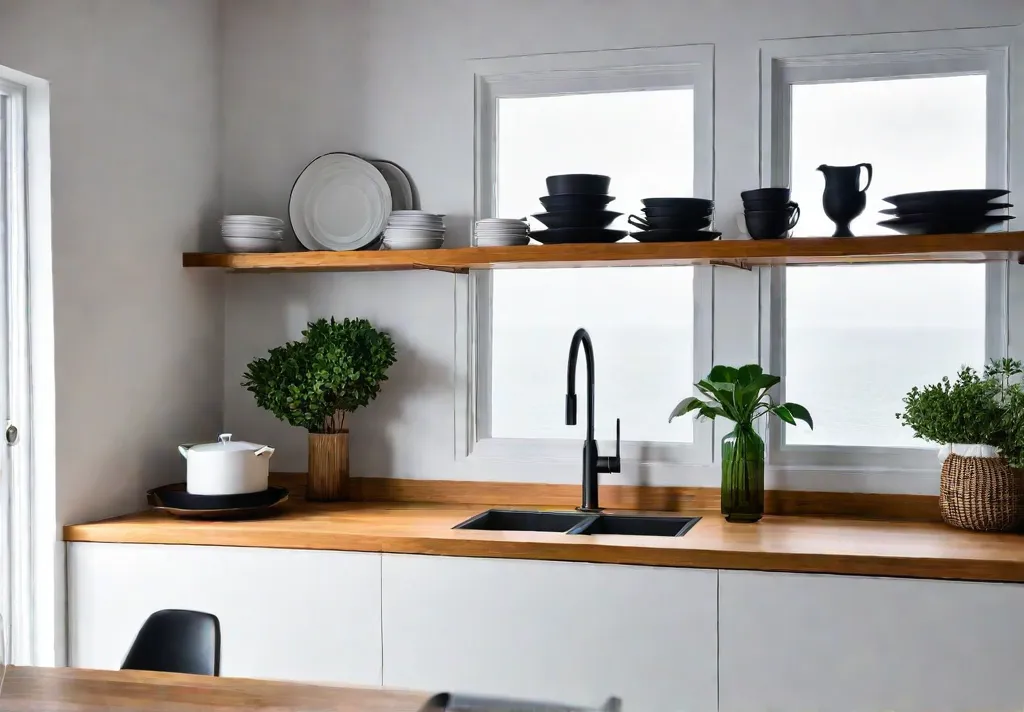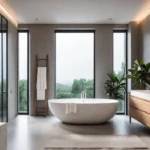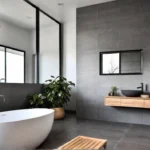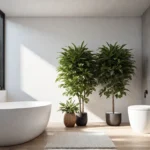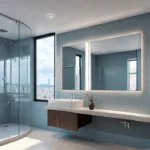Picture this: you’re standing in a sun-drenched kitchen, surrounded by soothing hues that evoke the tranquility of a secluded beach or a lush forest glade. The space feels airy and expansive despite its modest footprint. This is the transformative power of light colors in a small kitchen – a design approach that can turn even the most compact cooking area into a serene sanctuary.
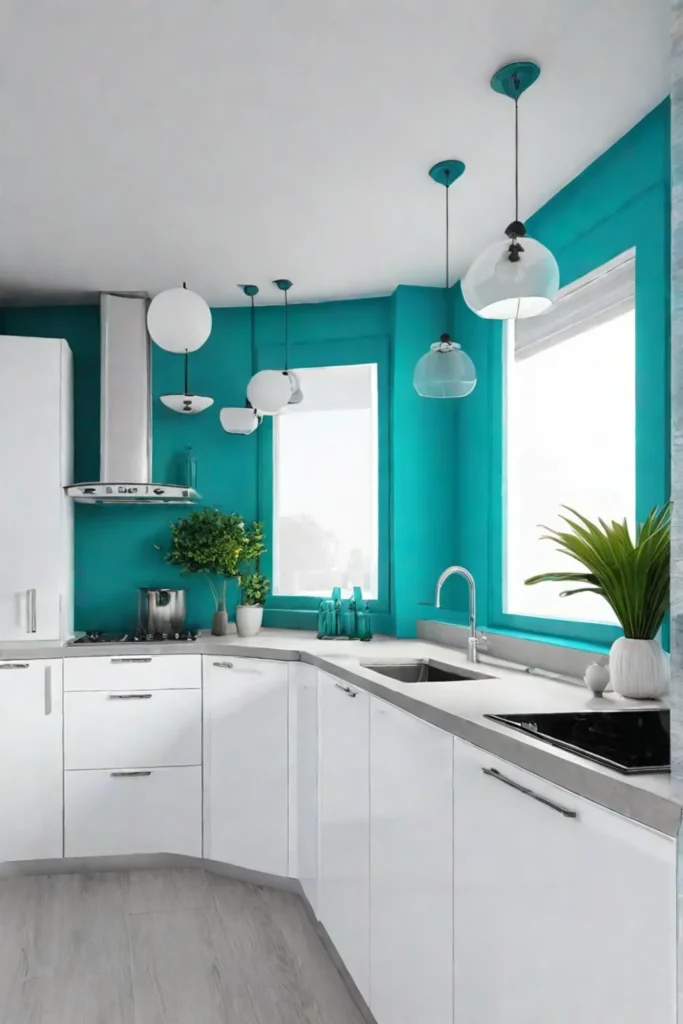
As someone who values conscious living and a connection with nature, you understand the importance of creating a stimulating home environment. And what better place to start than the heart of your home, the kitchen? By embracing light colors, reflective surfaces, open shelving, and strategic lighting, you can unlock a sense of spaciousness and serenity that belies the room’s physical dimensions.
Embracing the Airiness of Light Hues
Light colors have a remarkable ability to make small spaces feel larger and more inviting. This psychological phenomenon is rooted in our perception of depth and openness. When surrounded by soft, airy hues, our minds are tricked into believing the boundaries of the room extend further than they actually do.
The Art of Choosing the Perfect Palette
But not all light colors are created equal. The key is selecting shades that complement your style and create the desired ambiance. For a calming, expansive atmosphere, consider pale blues and greens – hues that mimic the serenity of nature. Alternatively, warm neutrals like creamy whites and soft grays can lend a cozy, minimalist vibe.
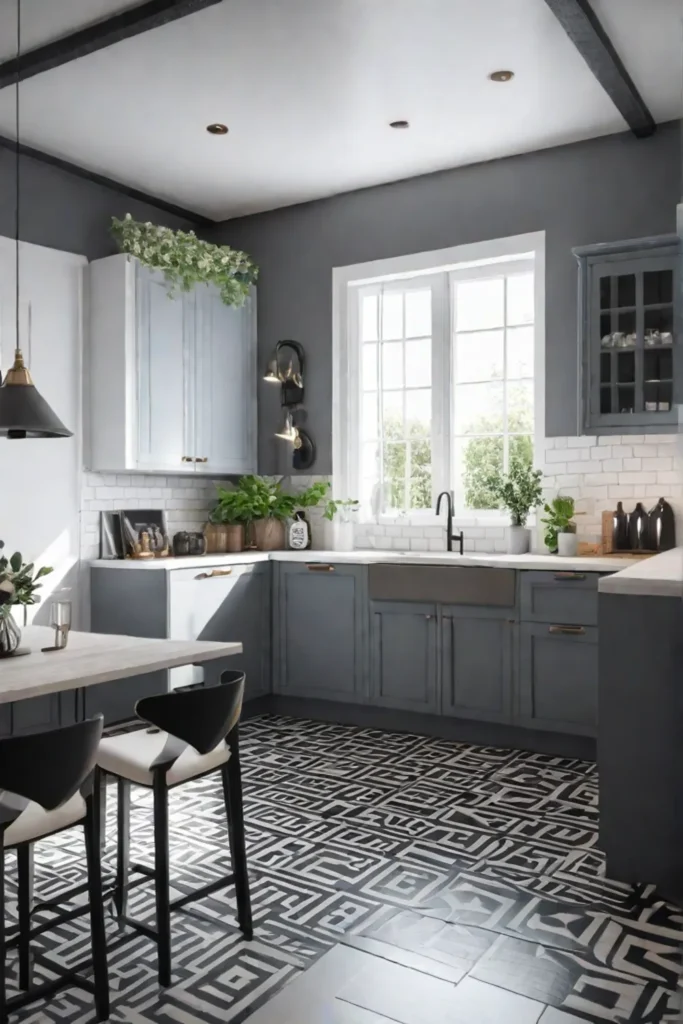
When selecting your color palette, it’s essential to coordinate with other design elements, such as hardware, appliances, and accents. A cohesive color scheme will create a harmonious, visually appealing space that feels intentional and purposeful.
“By surrounding ourselves with natural elements and light colors, our homes can become restorative sanctuaries – places where we can recharge and reconnect with our true selves.”
Bringing Light to Life
One of the most effective ways to incorporate light colors into your small kitchen is through cabinetry. Painting soft, creamy white cabinets can instantly create the illusion of depth and airiness. Complement this with light-colored backsplashes and countertops reflecting natural and artificial light, further enhancing the sense of openness.
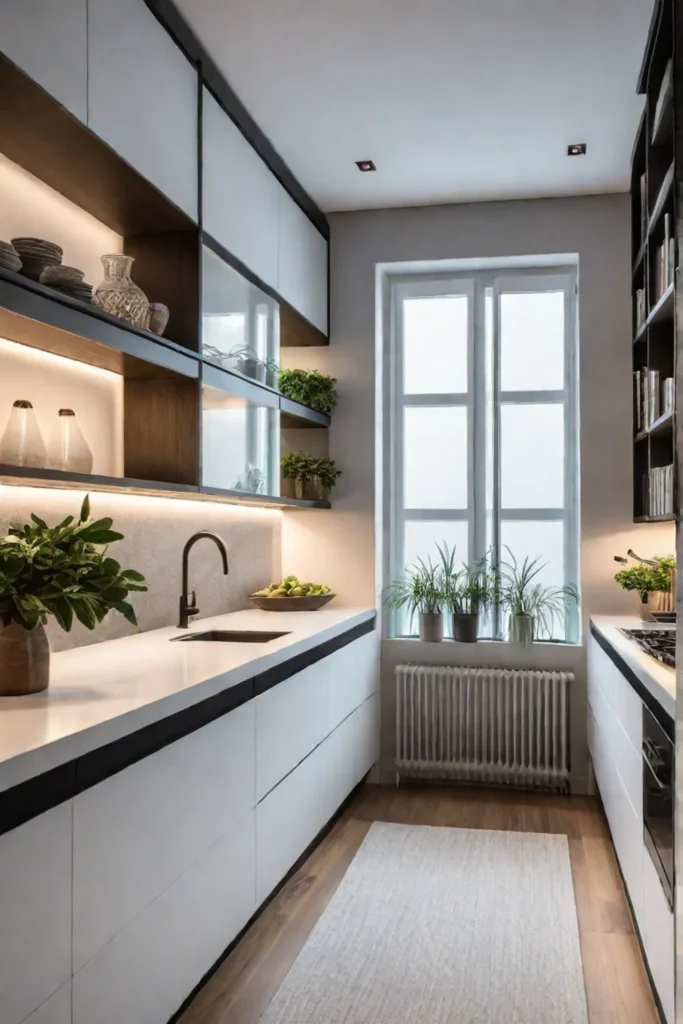
Remember, the strategic placement of light colors can also enhance the flow and functionality of your kitchen. For instance, using a lighter shade on the walls can make the space feel more expansive, while darker accents on the floor can ground the room and create a sense of stability.
Reflecting Radiance: The Power of Mirrored Surfaces
In small space design, reflective surfaces are nothing short of magical. By strategically incorporating elements like glass, mirrors, and glossy finishes, you can amplify your kitchen’s brightness and visual depth, creating the illusion of a larger, more spacious environment.

The Science of Reflection
The science behind this phenomenon is simple: reflective surfaces bounce light around the room, making it appear brighter and more expansive. Mirrors, in particular, can make a space seem nearly twice as large as it is, thanks to their ability to create the illusion of depth.
Glossy finishes on cabinets and countertops can also contribute to this effect, increasing the perception of space and adding a touch of modern sophistication to your kitchen.
Incorporating Reflective Elements
One of the most striking ways to incorporate reflective surfaces is through glass-front cabinets. These not only create the illusion of depth but also provide an opportunity to showcase your favorite dishware and accessories, adding visual interest to the space.
Strategically placing mirrors is another powerful technique. Consider hanging a large mirror on a wall opposite a window, reflecting natural light and creating the impression of a larger, brighter space. Alternatively, you can use smaller mirrors to bounce light into dark corners, enhancing the overall brightness and openness of the room.

When incorporating reflective surfaces, it’s important to strike a balance with other design elements. Too many mirrors or glossy finishes can create a disjointed, overwhelming effect. Instead, aim for a harmonious blend of reflective and matte surfaces, creating a cohesive, visually appealing space.
The Allure of Open Shelving
Open shelving is a design trend that has taken the interior design world by storm, and for good reason. In a small kitchen, open shelves can be a game-changer, providing visual and functional benefits that maximize your color scheme’s impact.
The Benefits of Open Shelving
Beyond their aesthetic appeal, open shelves can create the illusion of spaciousness by drawing the eye upward, creating the impression of height. This vertical emphasis can make a small kitchen feel up to 10% larger, a significant difference in a compact space.

Open shelving also offers a practical solution for maximizing storage in a small kitchen. By eliminating the visual barrier of closed cabinets, you can create a sense of openness while providing ample storage for your culinary essentials.
Incorporating Open Shelves with Style
Consider opting for light-colored, minimalist designs when incorporating open shelving into your small kitchen. These will complement your light color scheme and create a sense of airiness while also providing a blank canvas for displaying colorful dishware and accessories.
It’s important to balance open shelving with closed storage solutions to maintain a cohesive, organized look. This will ensure that your kitchen remains clutter-free and visually appealing while providing ample storage space.
Illuminating Your Space: The Power of Strategic Lighting
Lighting is often an overlooked element in small-space design, but it can profoundly impact the perception of space and the overall ambiance of your kitchen. By incorporating strategic lighting techniques, you can enhance the visual effect of your color scheme and create a warm, inviting atmosphere.

The Impact of Lighting
Proper lighting can make a small kitchen appear up to 30% larger, a significant difference in a compact space. Different lighting types can create various effects, from the illusion of depth and height to a cozy, intimate ambiance.
Layering different lighting sources is key to creating a dynamic and inviting atmosphere. Combining task, ambient, and accent lighting allows you to make a well-lit, functional, and visually appealing space.
Lighting Techniques for Small Kitchens
One of the most effective lighting techniques for small kitchens is under-cabinet lighting. These fixtures brighten work surfaces and create the illusion of depth, making the space feel more expansive.

Incorporating recessed lighting or pendant lights can also be a game-changer. These fixtures draw the eye upward, creating the impression of height and making the room feel larger and more open.
When planning your lighting scheme, it’s important to consider the balance between task and ambient lighting. Task lighting should focus on work areas, such as countertops and cooking surfaces, while ambient lighting should create a warm, inviting atmosphere.
Conclusion: Embracing Nature’s Serenity in Your Small Kitchen
You can transform your small kitchen into a visually stunning and highly functional space by leveraging the power of light colors, reflective surfaces, open shelving, and strategic lighting. Remember, the key to maximizing the impact of your small kitchen is to think creatively and focus on design elements that can expand the visual boundaries of the space.

With the right color scheme and design choices, you can create a kitchen that feels inviting and efficient, regardless of square footage. Embrace the serenity of nature and let your small kitchen become a therapeutic sanctuary, a place where you can find peace and reconnect with the beauty of simplicity.
So, what are you waiting for? Unleash your inner designer and create a small kitchen that embodies the essence of conscious, sustainable living – a space that nourishes your body, mind, and soul.
